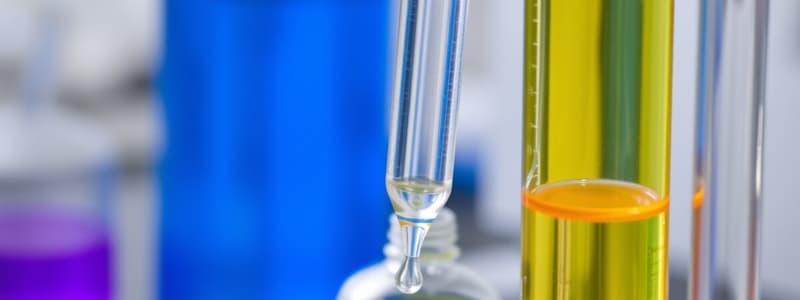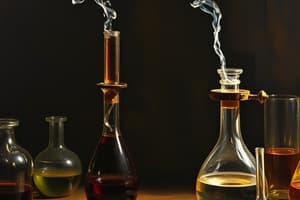Podcast
Questions and Answers
What is the primary function of a burette in the laboratory?
What is the primary function of a burette in the laboratory?
- To contain solid samples during heating
- To precisely measure the volume of a liquid (correct)
- To measure the temperature of a solution
- To mix solid substances
Which laboratory apparatus is primarily used for heating substances evenly?
Which laboratory apparatus is primarily used for heating substances evenly?
- Erlenmeyer Flask
- Beaker
- Florence Flask (correct)
- Graduated Cylinder
What type of flask is specifically used for accurate liquid measurement?
What type of flask is specifically used for accurate liquid measurement?
- Volumetric Flask (correct)
- Beaker
- Erlenmeyer Flask
- Crucible
Which of the following is NOT a function of a separatory funnel?
Which of the following is NOT a function of a separatory funnel?
The primary purpose of a mortar and pestle in a laboratory setting is to:
The primary purpose of a mortar and pestle in a laboratory setting is to:
What is the primary use of a graduated cylinder in a laboratory?
What is the primary use of a graduated cylinder in a laboratory?
Which equipment is specifically designed for suction filtration?
Which equipment is specifically designed for suction filtration?
What device is commonly used to transport a measured volume of liquid?
What device is commonly used to transport a measured volume of liquid?
Flashcards are hidden until you start studying
Study Notes
Laboratory Apparatus and Their Functions
-
Burette: Used for quantitative chemical analysis to measure liquid or gas volume; features a graduated glass tube with a stopcock for precise control during titrations.
-
Crucible: Cup-shaped equipment essential for containing chemical compounds when subjected to high heating, often used in various heating applications.
-
Separatory Funnel: Essential for liquid-liquid extractions; enables the separation of mixtures between immiscible solvents of varying densities.
-
Florence Flask: Designed for even heating of substances; widely utilized in distillation experiments due to its bulbed bottom which promotes uniform heat distribution.
-
Volumetric Flask: Specifically crafted for measuring and containing precise volumes of liquids, ensuring accuracy in chemical preparations.
-
Erlenmeyer Flask: Commonly employed for heating and boiling substances; its conical shape reduces the risk of spills during vigorous stirring or boiling.
-
Dropper: Device for transferring small liquid quantities; typically made from plastic and intended for single-use, ensuring hygienic handling of chemicals.
-
Weighing Boat: Serves as a container for dry chemicals before weighing, allowing for easy transfer and reducing contamination risks.
-
Pipette: Instrument tailored for transporting measured liquid volumes, crucial for precision in liquid handling.
-
Mortar and Pestle: Tool for grinding and mixing substances; the pestle acts as a heavy stick for pounding, while the mortar serves as the bowl.
-
Beaker: Basic laboratory container for liquids; widely used due to its versatility and ease of use.
-
Graduated Cylinder: Instrument designed for accurately measuring liquid volumes, crucial for various chemical reactions.
-
Glass Funnel: Facilitates the transfer of liquids into containers, minimizing spills and losses during pouring.
-
Büchner Funnel: Specialized for suction filtration processes, enhancing efficiency in separating solids from liquids.
-
Centrifuge Tube: Commonly utilized in centrifugation for separating components based on density, especially in laboratory settings.
-
Test Tube: Clear, cylindrical glass tube for experimentation; versatile for sample reactions and observations.
-
Test Tube Holder: Instrument for securely holding test tubes during reactions or when not in use, ensuring safety and stability.
-
Iron Ring: Supports items being heated, often used with clamps to position items over heat sources like Bunsen burners.
-
Watch Glass: Circular, slightly concave glass used for evaporating liquids and covering beakers; also effective for holding solids during weighing.
-
Evaporating Dish: Specifically designed for heating and evaporating liquids, enabling concentration of solutions.
-
Clay Triangle: Used to support crucibles over a heat source, typically resting on a tripod to stabilize and distribute heat evenly.
-
Thistle Tube: Glassware with a reservoir and funnel section, used for adding liquids into an existing apparatus setup, facilitating smooth liquid transfers.
-
Thermometer: Device for measuring temperatures of solids, liquids, and gases; commonly calibrated in degrees Celsius (°C), crucial for temperature control in experiments.
Studying That Suits You
Use AI to generate personalized quizzes and flashcards to suit your learning preferences.




